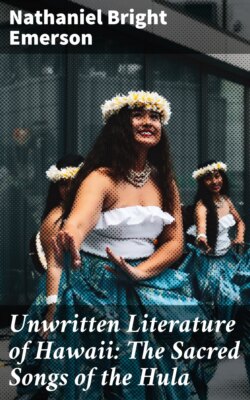Читать книгу Unwritten Literature of Hawaii: The Sacred Songs of the Hula - Nathaniel Bright Emerson - Страница 44
На сайте Литреса книга снята с продажи.
[Translation]
ОглавлениеUnstable the house of the shifty man,
Fickle as the wind Kaua-ula.
Treachery lurks in the house of Unstable.
Footnote 115:(return) Kaupoku. A variant of the usual form, which is kaupaku, the ridgepole of a house, its apex. The pa-ti when, worn takes the shape of a grass house, which has the form of a haystack.
Footnote 116:(return) Ula ka pali. Red shows the pali, i.e., the side hill. This is a euphemism for some accident by which the pa-ú has been displaced, and an exposure of the person has taken place, as a result of which the boys scream and even the sea-bird, the a'o, shrieks itself hoarse.
Footnote 117:(return) A'o. A sea-bird, whose raucous voice is heard in the air at night at certain seasons.
Footnote 118:(return) Hi'i-lawe. A celebrated waterfall in Wai-pi'o valley, Hawaii.
Footnote 119:(return) Primitive meaning, house; second, the body as the house of the soul.
Footnote 120:(return) Kaua-ula. A strong wind that shifted from one point to another, and that blew, often with great violence, at Lahaina, Maul. The above triplet was often quoted by the chiefs of olden time apropos of a person who was fickle in love or residence. As the old book has it, "The double-minded man is unstable in all his ways." (O ke kanáka lolilua ka manao lauwili kona mau aoao a pau.)
This is a typical Hawaiian poem of the better sort, keyed in a highly imaginative strain. The multitude of specific allusions to topographical names make it difficult to translate it intelligently to a foreign mind. The poetical units are often so devised that each new division takes its clue from the last word of the previous verse, on the principle of "follow your leader," a capital feature in Hawaiian poetry.
